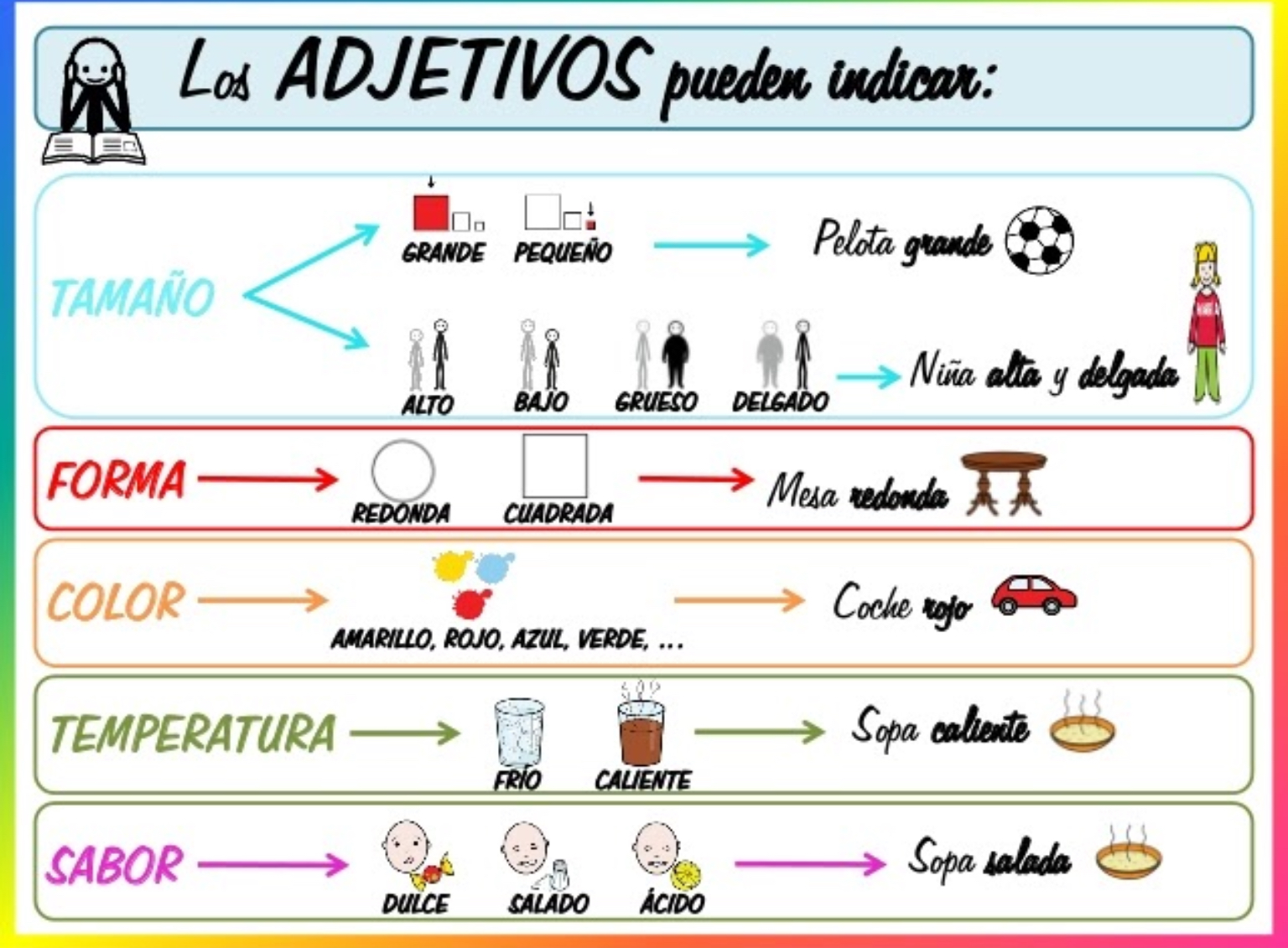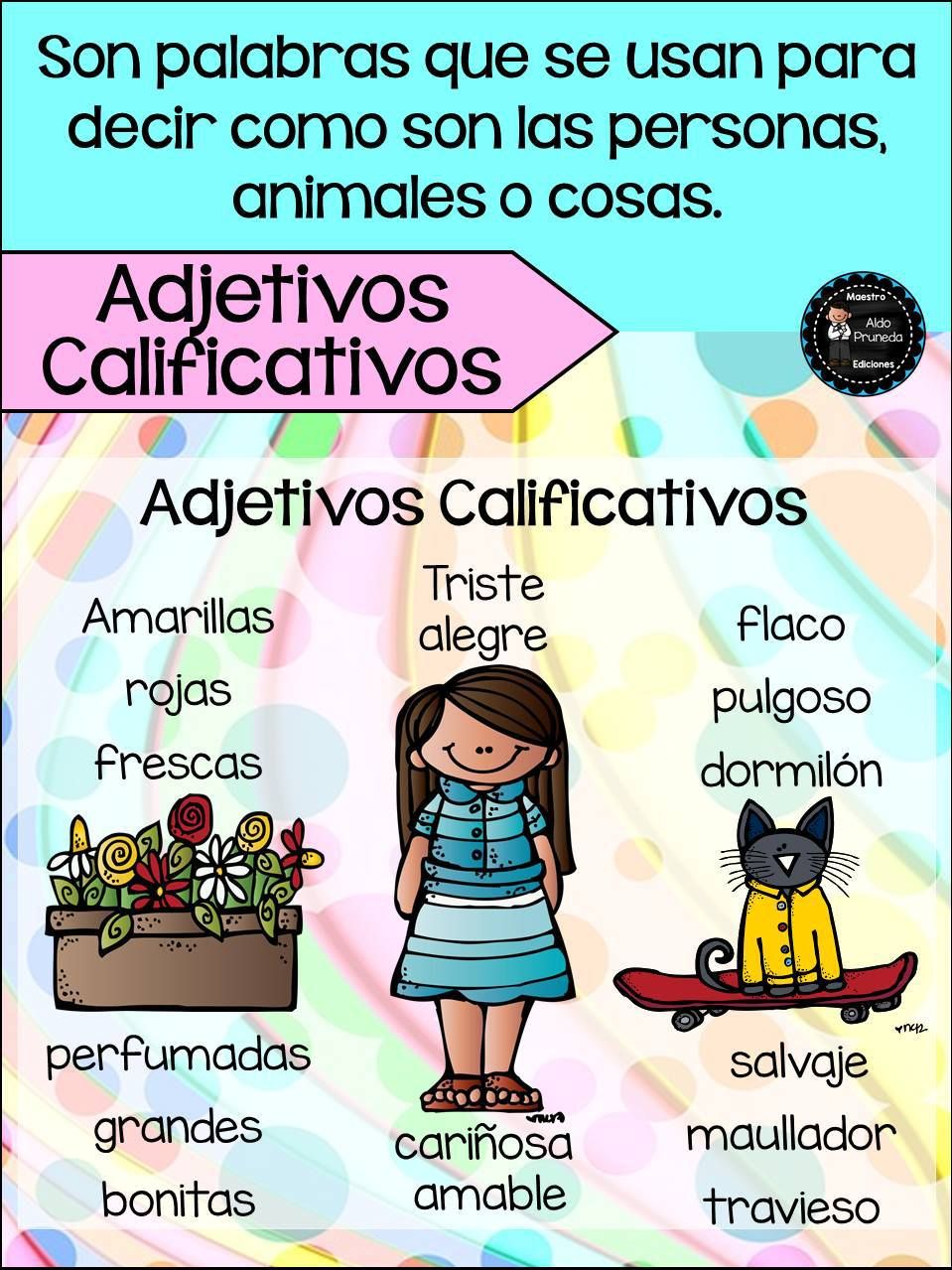Engaging Examples Of Adjectives: Usage And Meaning
What is "ejemplos adjetivo"?
"Ejemplos adjetivo" is the Spanish term for "adjective examples". An adjective is a word that describes a noun or pronoun. It can tell us more about the size, shape, color, age, or quality of something.
For example, in the sentence "The big red dog barked loudly," the adjectives "big" and "red" describe the noun "dog". The adjective "loudly" describes the verb "barked".
Adjectives are an important part of speech because they help us to create vivid and descriptive language. They can also help us to compare and contrast different things.
There are many different types of adjectives, including:
- Descriptive adjectives: These adjectives describe the qualities of a noun or pronoun. For example, the adjectives "big", "red", and "loud" in the sentence above are all descriptive adjectives.
- Demonstrative adjectives: These adjectives point out a specific noun or pronoun. For example, the adjectives "this", "that", and "these" are all demonstrative adjectives.
- Possessive adjectives: These adjectives show ownership of a noun or pronoun. For example, the adjectives "my", "your", and "his" are all possessive adjectives.
- Quantitative adjectives: These adjectives tell us how many or how much of something there is. For example, the adjectives "one", "two", and "many" are all quantitative adjectives.
- Interrogative adjectives: These adjectives are used to ask questions. For example, the adjectives "which", "what", and "whose" are all interrogative adjectives.
Adjectives play an important role in the Spanish language. They help us to create vivid and descriptive language, and they can also help us to compare and contrast different things.
Ejemplos adjetivo
Adjectives are words that describe nouns or pronouns. They can tell us more about the size, shape, color, age, or quality of something.
- Descriptive: These adjectives describe the qualities of a noun or pronoun. For example, the adjectives "big", "red", and "loud" in the sentence "The big red dog barked loudly" are all descriptive adjectives.
- Demonstrative: These adjectives point out a specific noun or pronoun. For example, the adjectives "this", "that", and "these" are all demonstrative adjectives.
- Possessive: These adjectives show ownership of a noun or pronoun. For example, the adjectives "my", "your", and "his" are all possessive adjectives.
- Quantitative: These adjectives tell us how many or how much of something there is. For example, the adjectives "one", "two", and "many" are all quantitative adjectives.
- Interrogative: These adjectives are used to ask questions. For example, the adjectives "which", "what", and "whose" are all interrogative adjectives.
Adjectives play an important role in the Spanish language. They help us to create vivid and descriptive language, and they can also help us to compare and contrast different things.
Descriptive
Descriptive adjectives are an important part of "ejemplos adjetivo" (adjective examples) because they help us to create vivid and descriptive language. They can tell us more about the size, shape, color, age, or quality of something.
- Role of Descriptive Adjectives in "Ejemplos Adjetivo":
Descriptive adjectives play a crucial role in providing specific details and characteristics of nouns and pronouns, making them essential for creating a clear and comprehensive understanding of the subject. - Examples from Real Life:
Descriptive adjectives are used extensively in everyday speech and writing. For instance, in the phrase "The majestic lion roared powerfully," the adjectives "majestic" and "powerfully" provide vivid descriptions of the lion and its actions, respectively. - Implications in the Context of "Ejemplos Adjetivo":
The inclusion of descriptive adjectives in "ejemplos adjetivo" is significant because it allows learners to observe and analyze the various ways in which adjectives can be employed to enhance the meaning and impact of a sentence or phrase.
In summary, descriptive adjectives are a fundamental aspect of "ejemplos adjetivo" as they provide essential details and characteristics of nouns and pronouns, contributing to the overall clarity and effectiveness of communication.
Demonstrative
Demonstrative adjectives play a crucial role in "ejemplos adjetivo" (adjective examples) as they serve the function of identifying and specifying particular nouns or pronouns within a sentence or phrase.
- Role in Identifying Specific Entities:
Demonstrative adjectives play a vital role in pinpointing and distinguishing specific nouns or pronouns in a sentence, helping to establish clear references and avoid ambiguity. They allow writers and speakers to direct the reader's or listener's attention to particular elements within the discourse. - Examples from Real-Life Communication:
Demonstrative adjectives are widely used in everyday communication. For instance, in the sentence "This book is more interesting than that one," the demonstrative adjectives "this" and "that" serve to identify and differentiate between two specific books. - Implications in the Context of "Ejemplos Adjetivo":
The inclusion of demonstrative adjectives in "ejemplos adjetivo" is significant because it allows learners to understand how these adjectives function in identifying and specifying nouns or pronouns. By studying examples, learners can develop a strong foundation in using demonstrative adjectives effectively. - Additional Facet: Proximity and Distance:
Demonstrative adjectives can also indicate proximity or distance in relation to the speaker or writer. For instance, the adjective "this" is often used to refer to something close to the speaker, while "that" is used to refer to something farther away.
In conclusion, demonstrative adjectives are an essential component of "ejemplos adjetivo" as they provide the means to identify and specify specific nouns or pronouns, contributing to the clarity and precision of language.
Possessive
Possessive adjectives play a vital role in "ejemplos adjetivo" (adjective examples) as they indicate ownership or belonging of a noun or pronoun to another noun or pronoun.
- Role in Establishing Ownership:
Possessive adjectives are essential for establishing ownership or possession of one entity by another. They help in clarifying the relationship between the possessor and the possessed, adding depth and precision to the sentence. - Examples from Real-Life Communication:
Possessive adjectives are commonly used in everyday communication. For instance, in the sentence "The dog wagged its tail," the possessive adjective "its" indicates that the tail belongs to the dog. - Implications in the Context of "Ejemplos Adjetivo":
The inclusion of possessive adjectives in "ejemplos adjetivo" is significant because it allows learners to observe how these adjectives are used to express ownership or belonging. By studying examples, learners can develop a strong foundation in using possessive adjectives correctly. - Additional Facet: Inalienable Possession:
Possessive adjectives can also indicate inalienable possession, which refers to inherent or intrinsic qualities or characteristics of a noun. For example, in the phrase "a lion's roar," the possessive adjective "lion's" indicates the characteristic roar of a lion.
In conclusion, possessive adjectives are an essential component of "ejemplos adjetivo" as they provide the means to express ownership or belonging, contributing to the clarity and precision of language.
Quantitative
Quantitative adjectives play a crucial role in "ejemplos adjetivo" (adjective examples) as they provide information about the quantity or amount of a noun or pronoun.
- Role in Specifying Quantity:
Quantitative adjectives are essential for specifying the exact number or amount of something, adding precision and detail to the sentence. They help in quantifying and comparing different entities. - Examples from Real-Life Communication:
Quantitative adjectives are widely used in everyday communication. For instance, in the sentence "I have two cats," the quantitative adjective "two" specifies the exact number of cats. - Implications in the Context of "Ejemplos Adjetivo":
The inclusion of quantitative adjectives in "ejemplos adjetivo" is significant because it allows learners to understand how these adjectives function in specifying quantity or amount. By studying examples, learners can develop a strong foundation in using quantitative adjectives effectively. - Additional Facet: Comparative and Superlative Forms:
Quantitative adjectives can also take comparative and superlative forms to compare quantities. For instance, in the phrase "the tallest building," the quantitative adjective "tallest" indicates the building with the greatest height.
In conclusion, quantitative adjectives are an essential component of "ejemplos adjetivo" as they provide the means to specify quantity or amount, contributing to the clarity and precision of language.
Interrogative
Interrogative adjectives form an essential part of "ejemplos adjetivo" (adjective examples) as they facilitate the formulation of questions, enabling us to seek specific information.
- Role in Question Formation:
Interrogative adjectives play a crucial role in constructing questions, guiding the reader or listener towards the desired response. They introduce questions that require specific details, clarifications, or choices. - Examples from Real-Life Communication:
Interrogative adjectives are commonly used in everyday communication. For instance, in the question "Which book did you read?", the interrogative adjective "which" prompts the listener to identify a particular book from a set of options. - Implications in the Context of "Ejemplos Adjetivo":
The inclusion of interrogative adjectives in "ejemplos adjetivo" is significant because it allows learners to observe how these adjectives are used to form questions. By studying examples, learners can develop a strong foundation in using interrogative adjectives effectively.
In conclusion, interrogative adjectives are an essential component of "ejemplos adjetivo" as they provide the means to formulate questions, contributing to the clarity and effectiveness of communication.
Preguntas Frecuentes sobre "Ejemplos Adjetivo"
Esta seccin proporciona respuestas a preguntas frecuentes sobre "ejemplos adjetivo" (ejemplos de adjetivos), aclarando conceptos, resolviendo dudas y ofreciendo informacin adicional.
Pregunta 1: Qu son los adjetivos?
Respuesta: Los adjetivos son palabras que describen o modifican a los sustantivos o pronombres, proporcionando informacin sobre sus cualidades, caractersticas o propiedades.
Pregunta 2: Cules son los diferentes tipos de adjetivos?
Respuesta: Hay cinco tipos principales de adjetivos: descriptivos, demostrativos, posesivos, cuantitativos e interrogativos, cada uno con su funcin y caractersticas especficas.
Pregunta 3: Cmo se utilizan los adjetivos en las oraciones?
Respuesta: Los adjetivos se colocan normalmente antes del sustantivo o pronombre que modifican, aadiendo informacin detallada y matices a la oracin.
Pregunta 4: Por qu son importantes los adjetivos?
Respuesta: Los adjetivos desempean un papel crucial en el lenguaje, ya que hacen que la comunicacin sea ms precisa, descriptiva y atractiva, ayudando a los hablantes y escritores a transmitir sus ideas con mayor claridad y vivacidad.
Pregunta 5: Existen reglas especiales para el uso de los adjetivos?
Respuesta: Aunque los adjetivos suelen seguir ciertas reglas de colocacin y concordancia, hay algunas excepciones y casos especiales que deben tenerse en cuenta para un uso correcto.
Pregunta 6: Cmo puedo mejorar mi uso de los adjetivos?
Respuesta: La prctica regular, la lectura de textos variados y el estudio de las reglas gramaticales pueden ayudar a mejorar el uso de los adjetivos, lo que lleva a una comunicacin ms efectiva y un lenguaje ms rico.
En resumen, "ejemplos adjetivo" son herramientas esenciales en el lenguaje que nos permiten describir y modificar sustantivos o pronombres, aadiendo detalles, claridad y expresividad a nuestra comunicacin.
Continuar leyendo: Prxima seccin del artculo
Conclusion
In conclusion, "ejemplos adjetivo" (adjective examples) play a vital role in language, providing the means to describe and modify nouns and pronouns, adding precision, detail, and expressiveness to our communication. By understanding the different types of adjectives and their functions, we can enhance our ability to convey our thoughts and ideas with greater clarity and impact.
The exploration of "ejemplos adjetivo" in this article has provided insights into the diverse roles that adjectives play in language, from specifying quantity and possession to identifying specific entities and asking questions. As we continue to delve deeper into the intricacies of language, the study of adjectives remains an essential aspect of mastering effective communication.
Mastering The Art Of Adding Significant Figures: A Comprehensive Practice Guide
Is Liquamycin Safe For Cats: A Detailed Guide For Pet Owners
The Ultimate Action-Packed Sequel: Die Hard 5: A Good Day To Die Hard


